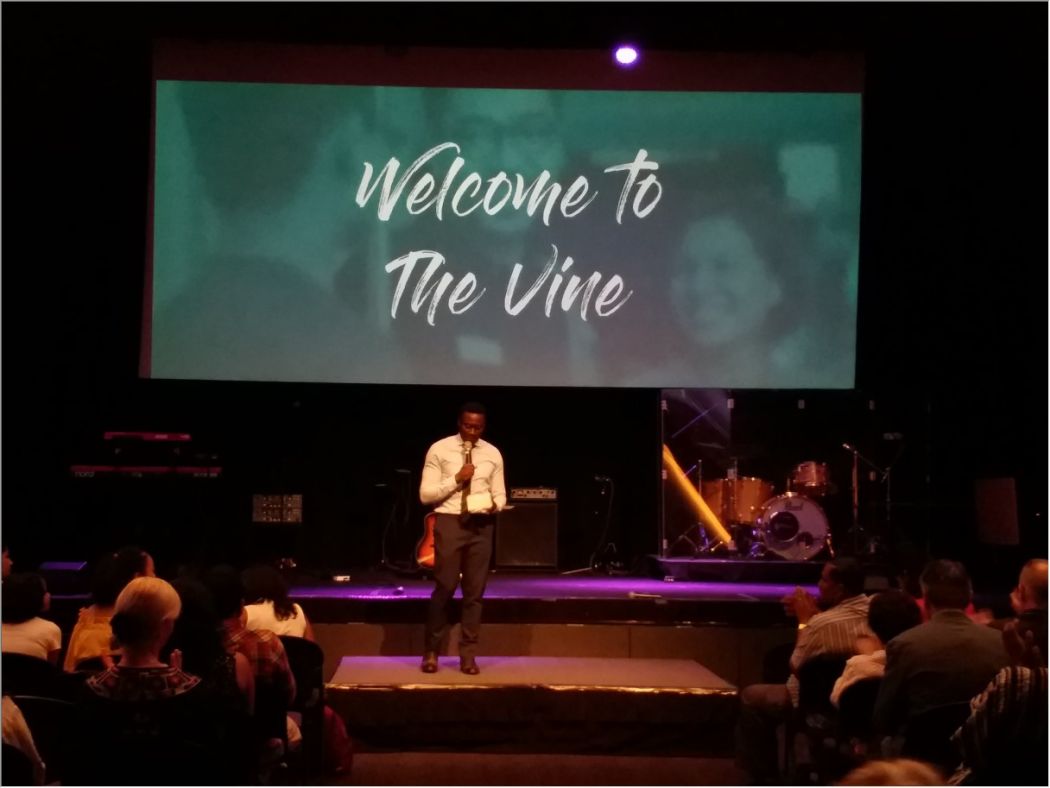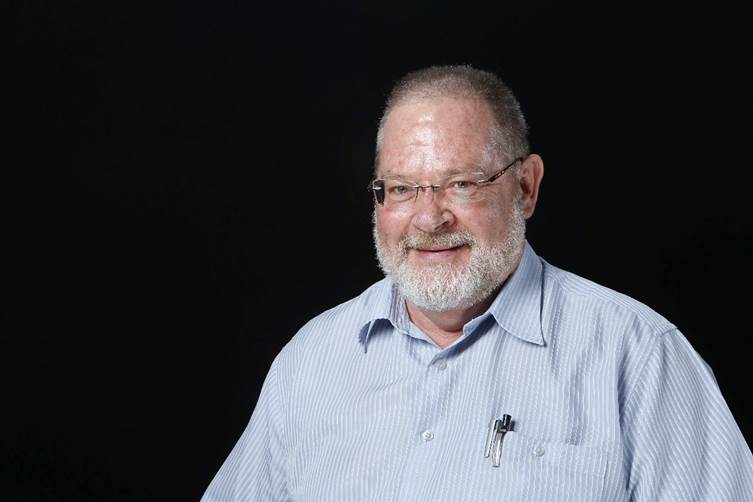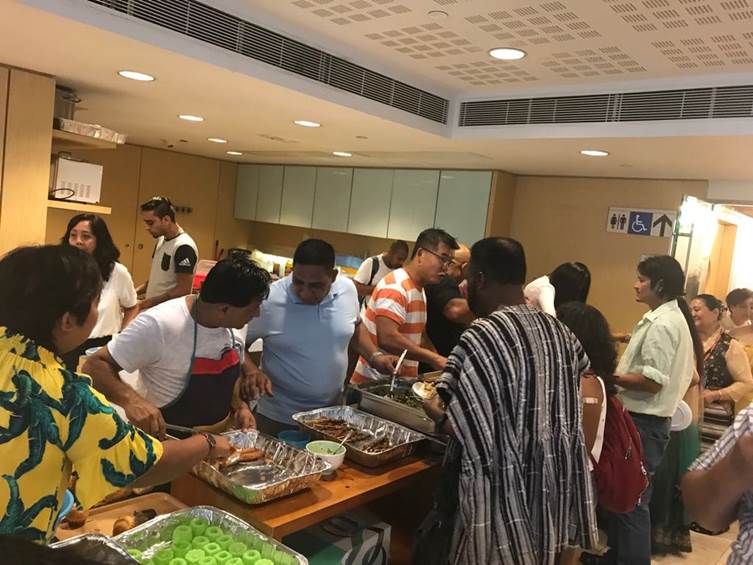by Joyce Wu
Sitting up on stage beside his wife, the 66-year-old John Macpherson’s bottom lip quivered as a South Asian woman recounted how the retiring New Zealander pastor helped move her family out of a dilapidated one-bedroom apartment in Sham Shui Po to Lantau Island. Finally, she had space to ride her bicycle with her daughter.
One by one, refugees and asylum seekers from Sri Lanka, Bangladesh, Pakistan, Egypt, and Nepal spoke through tears and broken English about the man they knew simply as Pastor John. In a foreign culture and land, he became their teacher and father, praying for them, visiting them in hospital and in prison, and covering rent while they were in prison. “I love you!” middle-aged men proclaimed, weeping over Macpherson.

Wearing a brimless black Nepali hat, Macpherson could no longer hold back tears as he watched the fruits of his labors from the past 14 years of serving as the founding pastor of The Vine Church’s Asian fellowship for refugees and asylum seekers in Hong Kong. This fellowship is part of the church’s wider refugee ministry program known as Refugee Opportunity and Development (ROAD). The July gathering at The Vine Church in Wan Chai was not only a send-off for Macpherson, but the passing of the baton as Roy Njuabe, the program manager of ROAD, takes over the ministry.
“I came like all of you sitting here, a refugee having nothing,” said Njuabe, 40, a former asylum seeker from Cameroon. “Pastor John picked me up. He taught me, equipped me with Scripture. He was there when I got married, when I had my first kid and my second kid.”
Many asylum seekers first head to Hong Kong because they don’t need a visa to enter the region. Almost 13,000 asylum seekers reside in Hong Kong as of February 2018, according to the Hong Kong Christian Council. This number includes those undergoing refugee status approval, those on appeal against a denied case, those who’ve applied for judicial review, and those awaiting repatriation.
Under the UN Convention Against Torture, Hong Kong is legally bound from sending back those seeking asylum. However, unlike China, Hong Kong is not a signatory of the UN Convention of Refugees, meaning it does not resettle refugees within its territory, but passes them onto the UN Refugee Agency, which then relocates them to a third country.
The screening process for asylum seekers typically stretches over years before they are confirmed or denied as refugees. For instance, Lama, 38, a Nepali member of the fellowship, has been in Hong Kong for 8 years and is still waiting for her status to be determined. The refugee approval rate in this city is astoundingly low at 0.75 percent compared to 30 to 40 percent in Europe. Even when asylum seekers are recognized as refugees, they must continue to wait for the third country to receive them.
A letter from prison
Macpherson hadn’t always imagined himself in refugee ministry. Needing a break from 21 years of social work in New Zealand, Macpherson arrived in Hong Kong in 2003 to participate in ministry to China. Near where he lived in Central was Victoria Prison, where asylum seekers were detained.

His empathy for the incarcerated prompted him to ask God how he could reach out and help those inside the prison. Coincidentally, one of them was a Sri Lankan asylum seeker who happened to find the address for The Vine in a newspaper advertisement and sent a letter to the church asking for a visit. Tony Read, the pastor of The Vine at the time and a friend of Macpherson’s, invited the social worker to join him in visiting detained asylees. To Macpherson, this was an answered prayer.
Released from detention, the same asylum seeker who had first written to The Vine asked for a Bible study and help with English for him and his wife, who spoke mainly Tamil and Sinhalese respectively. Macpherson then led a study for that couple and another that spoke only Nepali. Members soon brought friends to the group. A year later, seven people in the group got baptised.
Children of God
Today, ROAD serves more than 600 asylum seekers from South Asia, Africa, and the Middle East. Besides separate Asian and African fellowships that include singing, praying, listening to a sermon and discussing in small groups, the ministry also provides services for asylees such as rent subsidies, computer training, and English classes.
Financial aid is crucial for the displaced community that is not allowed to work in Hong Kong. Asylum seekers rely on a monthly government allowance of $2,700 for housing and food in a city where the average monthly rent for a 450-square-foot apartment is roughly $16,000. One asylum seeker from India noted that many asylees want to work and make use of their education and skills, but can’t. Without work, many feel they lack a sense of purpose as they wait to hear about their status.

ROAD helps asylum seekers make the most of their time. Lama said she fills her days with classes. “I get knowledge,” she said cheerfully, listing off waiter and barista training, IT class, and leadership course. “The whole day, I have a schedule.” At the Wednesday morning Asian fellowship, the mother of three sings Nepali worship songs and performs Nepali dance.
Yet ROAD also needs to stay vigilant about those coming to freeload off its generosity: an attendance policy is enforced to ensure participants arrive on time and stay for activities before distributing transportation money. It is also important to caution female volunteers, who may feel they are targeted by male participants with the hope of marriage for residency.
Cultural clashes are also an inherent difficulty in refugee ministry. “People don’t just get along,” Macpherson said. “Sometimes we do have fights.” Macpherson remembers a disagreement he once witnessed between members of different African countries that escalated to the point where he feared “someone’s going to die!” The pastor would often pull the offenders aside and remind them, “This is not how a family behaves.” Teaching the members their identity as children of God mattered more than tribal or caste loyalty, Macpherson’s also learned to bring a “talking stick” to meetings: only the one holding the stick can speak.
Taking care of the spiritual, social, and financial needs of this community is a heavy burden. Before Macpherson’s handover to Njuabe, I followed the successor for a day to see what it was like.

After a 9am meeting, he whisked me off to his church office, where he sent out a confirmation email about subsidising an asylum seeker’s rent. Multitasking on his iPhone as he walked down the stairs, he then dashed off to emcee the Asian fellowship’s anniversary celebration. I lost Njuabe while checking out the buffet-style chicken curry, tuna stew, and chopped greens the fellowship provided for lunch, as he disappeared to an urgent meeting about a donor. When he resurfaced, he was soon off to a one-on-one counseling session with Lama. By 4:30pm, finally available to sit down with me, Njuabe looked drained and still hadn’t had lunch.
Njuabe believes providing asylum seekers with skills helps them become better citizens no matter where they ultimately end up. Asylum seekers have three possible outcomes: repatriation to their home country, resettle in a third country, or integrate into Hong Kong.
“I don’t want them to become a burden to Canada, I want them to be an asset to the country,” said Njuabe. “If they remain in Hong Kong, I don’t want them to be beggars and depend on charities.”
Joyce Wu is a volunteer English teacher to refugees and asylum seekers at St Andrew’s Church.
